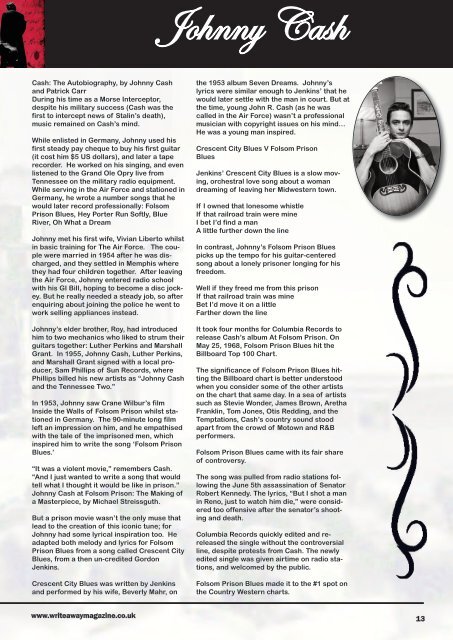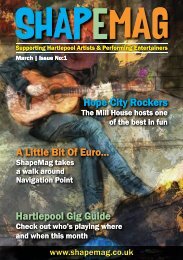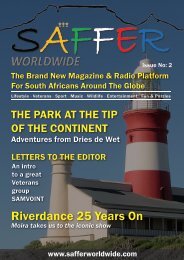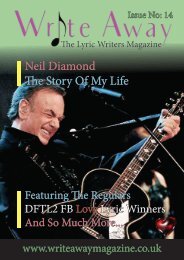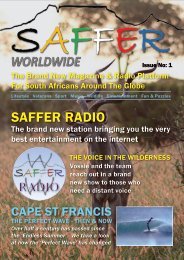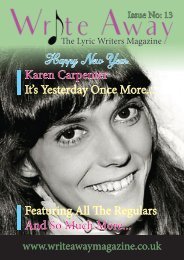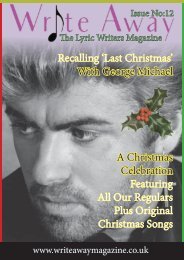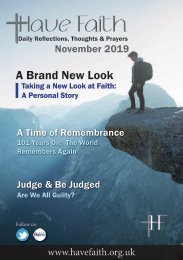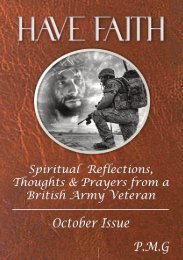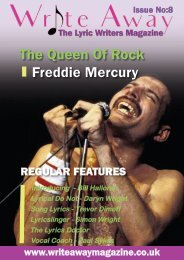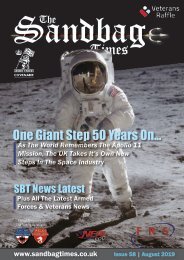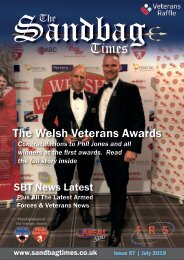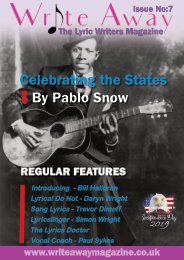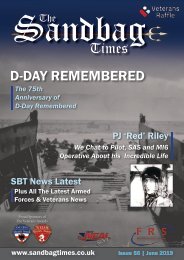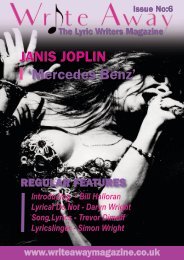Create successful ePaper yourself
Turn your PDF publications into a flip-book with our unique Google optimized e-Paper software.
]É{ÇÇç Vtá{<br />
Cash: The Autobiography, by Johnny Cash<br />
and Patrick Carr<br />
During his time as a Morse Interceptor,<br />
despite his military success (Cash was the<br />
first to intercept news of Stalin’s death),<br />
music remained on Cash’s mind.<br />
While enlisted in Germany, Johnny used his<br />
first steady pay cheque to buy his first guitar<br />
(it cost him $5 US dollars), and later a tape<br />
recorder. He worked on his singing, and even<br />
listened to the Grand Ole Opry live from<br />
Tennessee on the military radio equipment.<br />
While serving in the Air Force and stationed in<br />
Germany, he wrote a number songs that he<br />
would later record professionally: Folsom<br />
Prison Blues, Hey Porter Run Softly, Blue<br />
River, Oh What a Dream<br />
Johnny met his first wife, Vivian Liberto whilst<br />
in basic training for The Air Force. The couple<br />
were married in 1954 after he was discharged,<br />
and they settled in Memphis where<br />
they had four children together. After leaving<br />
the Air Force, Johnny entered radio school<br />
with his GI Bill, hoping to become a disc jockey.<br />
But he really needed a steady job, so after<br />
enquiring about joining the police he went to<br />
work selling appliances instead.<br />
Johnny’s elder brother, Roy, had introduced<br />
him to two mechanics who liked to strum their<br />
guitars together: Luther Perkins and Marshall<br />
Grant. In 1955, Johnny Cash, Luther Perkins,<br />
and Marshall Grant signed with a local producer,<br />
Sam Phillips of Sun Records, where<br />
Phillips billed his new artists as “Johnny Cash<br />
and the Tennessee Two.”<br />
In 1953, Johnny saw Crane Wilbur’s film<br />
Inside the Walls of Folsom Prison whilst stationed<br />
in Germany. The 90-minute long film<br />
left an impression on him, and he empathised<br />
with the tale of the imprisoned men, which<br />
inspired him to write the song ‘Folsom Prison<br />
Blues.’<br />
“It was a violent movie,” remembers Cash.<br />
“And I just wanted to write a song that would<br />
tell what I thought it would be like in prison.”<br />
Johnny Cash at Folsom Prison: The Making of<br />
a Masterpiece, by Michael Streissguth.<br />
But a prison movie wasn’t the only muse that<br />
lead to the creation of this iconic tune; for<br />
Johnny had some lyrical inspiration too. He<br />
adapted both melody and lyrics for Folsom<br />
Prison Blues from a song called Crescent City<br />
Blues, from a then un-credited Gordon<br />
Jenkins.<br />
Crescent City Blues was written by Jenkins<br />
and performed by his wife, Beverly Mahr, on<br />
the 1953 album Seven Dreams. Johnny’s<br />
lyrics were similar enough to Jenkins’ that he<br />
would later settle with the man in court. But at<br />
the time, young John R. Cash (as he was<br />
called in the Air Force) wasn’t a professional<br />
musician with copyright issues on his mind…<br />
He was a young man inspired.<br />
Crescent City Blues V Folsom Prison<br />
Blues<br />
Jenkins’ Crescent City Blues is a slow moving,<br />
orchestral love song about a woman<br />
dreaming of leaving her Midwestern town.<br />
If I owned that lonesome whistle<br />
If that railroad train were mine<br />
I bet I’d find a man<br />
A little further down the line<br />
In contrast, Johnny’s Folsom Prison Blues<br />
picks up the tempo for his guitar-centered<br />
song about a lonely prisoner longing for his<br />
freedom.<br />
Well if they freed me from this prison<br />
If that railroad train was mine<br />
Bet I’d move it on a little<br />
Farther down the line<br />
It took four months for Columbia Records to<br />
release Cash’s album At Folsom Prison. On<br />
May 25, 1968, Folsom Prison Blues hit the<br />
Billboard Top 100 Chart.<br />
The significance of Folsom Prison Blues hitting<br />
the Billboard chart is better understood<br />
when you consider some of the other artists<br />
on the chart that same day. In a sea of artists<br />
such as Stevie Wonder, James Brown, Aretha<br />
Franklin, Tom Jones, Otis Redding, and the<br />
Temptations, Cash’s country sound stood<br />
apart from the crowd of Motown and R&B<br />
performers.<br />
Folsom Prison Blues came with its fair share<br />
of controversy.<br />
The song was pulled from radio stations following<br />
the June 5th assassination of Senator<br />
Robert Kennedy. The lyrics, “But I shot a man<br />
in Reno, just to watch him die,” were considered<br />
too offensive after the senator’s shooting<br />
and death.<br />
Columbia Records quickly edited and rereleased<br />
the single without the controversial<br />
line, despite protests from Cash. The newly<br />
edited single was given airtime on radio stations,<br />
and welcomed by the public.<br />
Folsom Prison Blues made it to the #1 spot on<br />
the Country Western charts.<br />
www.writeawaymagazine.co.uk<br />
13


